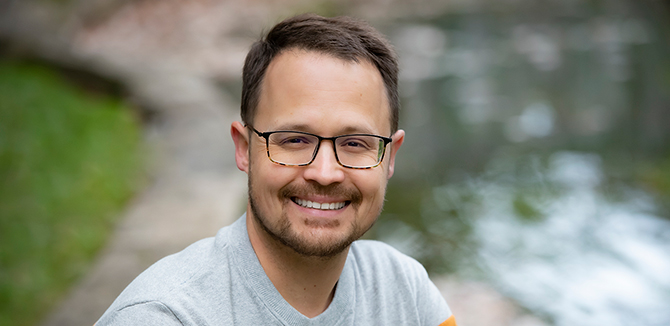From Waste to Want
George Wells relies on MBP students to help move research forward that could have a positive impact on the planet by creating value from what others see as worthless.

Where others see waste, George Wells sees opportunity.
Wells is an associate professor in the Department of Civil and Environmental Engineering and a research advisor for students in Northwestern Engineering's Master of Biotechnology Program (MBP). Over the past dozen years, he’s welcomed nine MBP students into his lab to assist in his research efforts focused on environmental sustainability, clean water, bioenergy, and resource recovery.
In the process, these students begin to see nutrient-rich wastewater and other things similarly to how Wells does – as opportunities to produce energy and reduce humans’ impact on the planet.
“A very important goal for students in my lab is to inspire curiosity and a love of knowledge and science,” Wells said. “Our work is fundamentally curiosity driven, so that sense of curiosity is essential, and it’s what makes the work fun.”
Fun, yes. Important, too.
A scientific model published in 2021 found that wastewater adds 6.2 million tons of nitrogen to coastal waters worldwide annually. Nitrogen is one of the worst pollutants of our planet’s oceans, causing toxic algae blooms, the loss of oxygen in water, and dead zones unable to support life.
Research in Wells’ lab is geared toward taking waste and turning it into environmental biotechnology that extracts all possible resources for use in energy-generation, for fertilizer production, and to generate clean water. The goal is to make wastewater treatment energy independent – meaning the waste itself provides the power needed to treat future waste — while producing clean water and recovering additional resources.
MBP students are critical to this effort, Wells said, and the program is set up to create just such an impact. Research constitutes 40 percent of the program’s curriculum, providing a key advantage for MBP students over those from competing programs.
Wells said there are many commonalities in the MBP students he’s encountered.
“MBP students have a stellar mixture of skills blending molecular biology, experimental design, and bioprocess and bioreactor engineering,” he said. “They are passionate about protecting human health and the environment. Biotechnology for sustainability is a key interest for a significant subset of MBP students, which is great, as that’s exactly what we focus on in my group.”
Wells said interacting with students and guiding them as they develop as scientists is a big part of why he loves his job.
“My goal for students in my lab is to progress in their development as independent researchers,” he said. “It’s immensely enjoyable to see students progress in their understanding, begin to make intuitive connections between different areas of inquiry, and mature as scientists.”
Wells views the relationship as mutually beneficial. Students contribute to the work he is trying to accomplish, and he gives the students a transparent look into life as a researcher. The main points he tries to instill?
“Persistence, grit, and curiosity are keys to success,” he said. “An experiment that fails in the lab is not actually a failure. It’s an opportunity to learn and iterate.”
He also sees clearly how his lab’s work fits into the larger MBP ecosystem.
“The combination of classroom learning, hands-on research, and internship experiences really differentiates MBP students from other masters programs,” he said. “MBP students are in very high demand after graduation for exactly this reason.”

